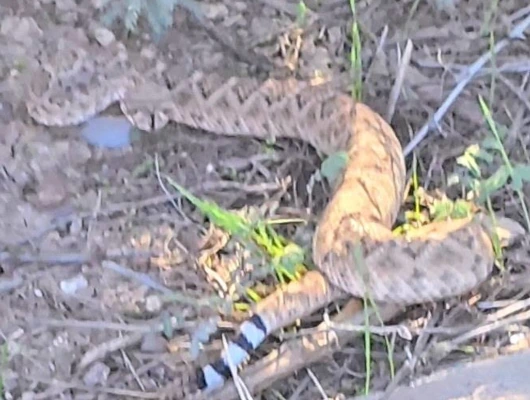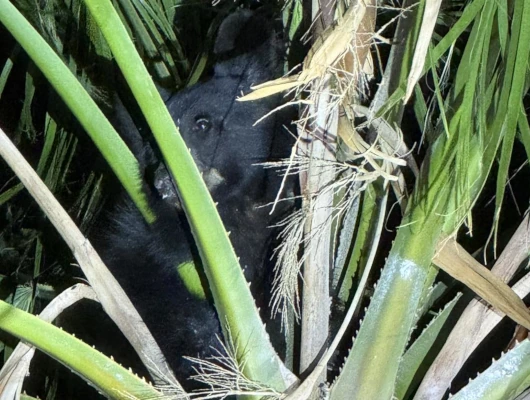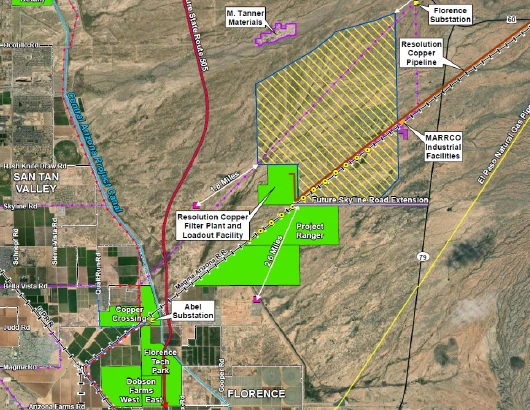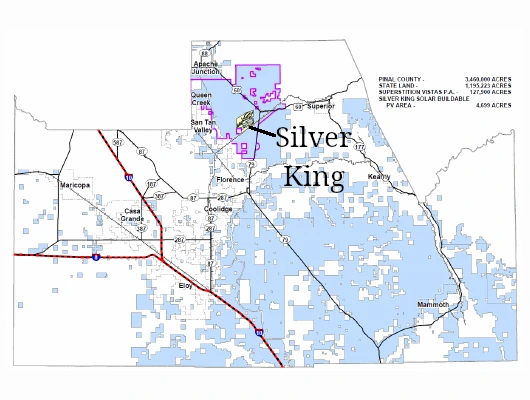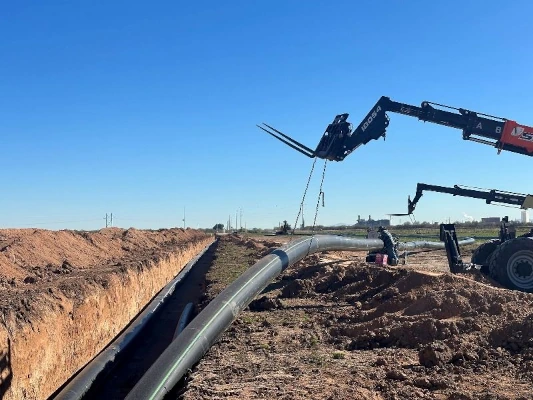The Pinal County Planning and Zoning Commission unanimously approved a Special Use Permit (SUP) for Arf-Anage Dog Rescue during their April 17 meeting. The permit allows the nonprofit organization to continue operating their rescue facility on a 2.5-acre property in unincorporated Pinal County.
Rescue Facility Details
The property, located at 53480 W Bowlin Road in Maricopa, has served as a dog rescue facility since 2020. According to the staff report, the site features kennel structures along the north and northwest perimeter with multiple open areas for dog runs. The property is enclosed by a masonry block wall that Roe described during the meeting as seven feet high.

“We rake out the enclosures every day,” said property owner and applicant Cathy Roe during the meeting. “We recently installed seven tons of quarter minus gravel that will help with odor control and dust.”
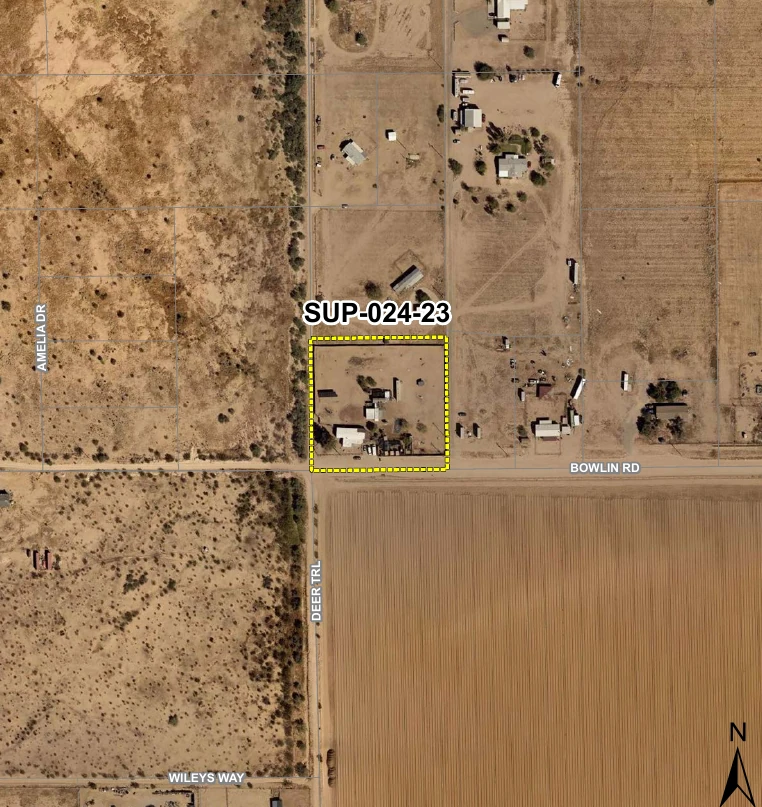
The applicant’s narrative in the staff report describes housing for up to 100 dogs. During the meeting, Roe explained they typically maintain fewer than 70 dogs at a time, with 80 as their maximum capacity during emergencies or when foster homes return dogs.
Understanding Special Use Permits
The commission’s approval came under a provision allowing them to recommend “such other uses as the planning commission may deem appropriate in the public interest.” Although commercial kennels are not listed as permitted in GR zoning, they are a listed special use in RU-1.25 zoning. Staff described the GR and RU-1.25 districts as functionally comparable for this purpose.
Senior Planner Patrick Zaia-Roberts explained that the application was part of a group of five similar commercial kennel cases discussed during a January 18, 2024 commission meeting. The use of Special Use Permits allows these existing operations to come into compliance with county regulations.
“A SUP authorizes a use to be developed in a particular way as specified by the permit and its conditions,” Zaia-Roberts said during his presentation.
Setbacks and Permitting Discussion
Commissioners questioned the placement of kennels near property lines, with Commissioner Karen Mooney asking about required setbacks. Commissioner Tom Scott clarified that not all structures require permits. “Unless they’re structures, they don’t have to apply for a permit. And if the fences aren’t over seven feet high, they don’t have to apply for a permit,” Scott said.
Roe addressed setback concerns, explaining: “Our wall is well within the property lines. The original fence that was there was at least 25 feet from the property line on the north side, and then we’re about three to five feet on the two sides, east and west.”
She added, “We were told that, if they’re open kennels, that they’re not required to have a setback.” Roe described the kennel construction as having “wood on the sides, the block in the back, and then chain link in the front” with cloth shading and recently built 8×8 structured shadings for the dogs.
Rescue Operations and Mission
Arf-Anage Dog Rescue has operated as a 501(c)(3) nonprofit since 2015. According to Roe, they have approximately 90 foster homes in addition to their facility.
“The idea of the ranch, that’s what we call it, our rescue ranch, is for dogs that fosters have returned that have nowhere to go,” Roe explained. “We do have some feral dogs there and other unadoptable dogs. We have a lot of adoptable dogs there. Right now, there’s about 75 dogs there, and I would say 80% of them are adoptable dogs.”
Roe mentioned that adoptable dogs go to various locations for adoption events, including PetSmart, Petco, and Odyssey around the valley. “We are based in Pinal and Maricopa counties, and we service both areas,” she added.
Bettina Potter, a representative for the rescue, highlighted their special programs during public comments. “We have a Pets for Vets and First Responders Program. Many of the dogs at the ranch qualify for that program, in which our fees are waived for those individuals that come to us and want to adopt a dog,” Potter said.
Potter emphasized their commitment to reducing pet overpopulation. “Our tagline of ‘No mom left behind’ is that we literally will not leave a pregnant mama or a mama that has just given birth behind anywhere to have anything negative happen to it,” she said. “Last year, we adopted out a thousand dogs.”
When asked about how long dogs stay at the facility, Roe said during the hearing that the average stay is 69 days, based on data from their database. She noted that some dogs, particularly those that were feral when brought in, have remained at the facility for years.
Public Support
While no written public comments were submitted, several individuals spoke in support during the public hearing, including Eloy Mayor Andrew Sutton.
“This is an organization that is run with compassion, and they abide by all the animal control regulations and licensing that they have,” Sutton said. “This is a charity, and does not cost Pinal County for its operation or services.”
Sutton warned that closing the facility would burden county animal control services. “Eloy pays Pinal County Animal Rescue and Animal Control a lot of money to help with the animal control in our city. To put all these dogs into a system that is already stretched thin is really not a good use of anybody’s money.”
Tina Morrison delivered an emotional plea for the rescue’s continuation. “The property we’re discussing, known as the Ranch, is the heart of our rescue. It’s where we care for the dogs no one else can or will. The scared dogs, the ones pulled from the euthanasia list, and those that aren’t suited for foster homes yet. They come here to find safety and healing.”
Morrison emphasized that the Special Use Permit request “isn’t about growth or profit. It’s about survival. Survival for the dogs, and survival for the system that’s already stretched to its limits.”
She warned of the consequences if the permit were denied: “If this request is denied, the Ranch will no longer be able to operate, and the burden of that doesn’t disappear. It will fall directly onto Pinal County Animal Control and surrounding shelters. We all know the reality. Shelters are full, staff are overwhelmed, and hard decisions are being made every single day.”
Morrison also described their last litter program: “We take in entire litters of puppies, but in return, we take the moms and we fix them and we vaccinate them. We give them back to the owners at no cost to them. This is to help people who can’t afford to fix their dogs, and to stop the over-breeding.”
In her closing remarks, Morrison appealed to the commission’s sense of community responsibility. “We’re not asking for handouts. We’re already doing the hard work. We’re doing it on our own time and with our own money, and with our whole hearts. We want to be part of the solution. All we need is a chance to keep going.”
When asked by Commissioner Scott about staffing, Morrison confirmed, “We do. We do. We have two men that live on site 24 hours.” She added that they have a ranch manager who is there during Monday through Friday operating hours and “on call 24/7,” plus “another worker that comes in during week hours” and a maintenance person.
Neighborhood Meeting and Public Input
According to the staff report, the applicant held a neighborhood meeting on May 10, 2023, at the Thunderbird Fire Station in Maricopa. Six attendees were present at the meeting. Questions were raised about the property wall, fencing, drainage, and the number of dogs on site. One attendee commented that as long as all business was conducted on the applicant’s property, they had no objections.
When Commissioner Scott asked about noise levels, Roe stated that they haven’t had any noise complaints from neighbors. “The wall has helped it a lot,” she added. “Most of the neighbors knew that that’s what we were buying the property for.”
Conditions and Future Steps
The commission’s approval included 12 stipulations, with two amendments. Stipulation #5 was revised to specify “rescue operations” rather than “breeding operations,” and stipulation #6 was corrected to reference the proper case number.
Other conditions require the applicant to maintain a commercial kennel license from Pinal County Animal Control, submit a site plan application within one year, meet Lighting Zone 1 requirements, and prohibit new signage.
The Planning and Zoning Commission’s recommendation will next go to the Pinal County Board of Supervisors for final consideration. If approved by the Board, the Special Use Permit will remain valid as long as the rescue operation continues and complies with all stipulated conditions.

